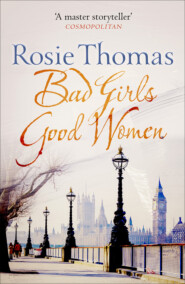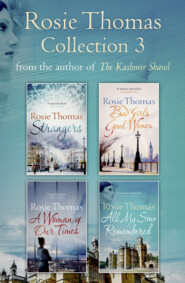По всем вопросам обращайтесь на: info@litportal.ru
(©) 2003-2024.
✖
The White Dove
Автор
Год написания книги
2018
Настройки чтения
Размер шрифта
Высота строк
Поля
Isabel let her head rest against Peter’s shoulder. Her eyes were closed and Amy couldn’t guess what she was thinking, but her face was smooth.
It’s all right, Amy thought.
She wanted to slip away and let the maid see her out, but they jumped up when she stood up to go, and insisted on coming downstairs with her.
At the street door Peter hailed a taxi for her.
‘I hope there will be hundreds more Ebury Street evenings like this one,’ Amy said.
‘Of course there will,’ Peter answered, and Isabel echoed him. ‘Of course there will.’
As the cab pulled away Amy looked back at them. They stood side by side framed by the light that spilled out of their front door and down the steps. They lifted their hands and waved to her, in unison.
There was a wonderful, tantalizing smell filling the dusty hall.
The men came filing in, too tired to joke any longer or even to talk, and dropped their bundles against the walls without looking at them. But the smell drew them to cluster round the open door at the end of the hall.
‘This way, lads. That’s right.’ It was the catering contingent who had gone on ahead of the marchers from stop to stop, and had been waiting for them with hot food at the end of every day. Silverman and his friends on the Organizing Council had done well, Nick thought. The soup was being ladled out of big pans into a medley of cups and bowls. Nick was ravenous, but he waited until he had seen all his Nantlas contingent into the line before joining the end of it himself with the other march leaders.
It was the last night.
They had reached the outskirts of London, where new factories were springing up along the Great West Road and rows of neat, suburban houses in their square gardens stretched to the north and south of them. On every street corner here there was a little grocer’s shop or a tobacconist’s, windows and walls bright with coloured signs. The long column of dirty, exhausted men had tramped silently past the homeward-bound workers, men coming out of the shops with the evening newspaper under their arm and packets of cigarettes in their pockets, and women in bright, spring-like clothes carrying baskets of food.
There had been cheering supporters lining the route, more tonight than on any of the others because the London Workers had turned out to greet them. But in the tranquil streets behind them the ordinary people going about their business had stared in surprise. London looked prosperous, different from any of the other places they had been through. Nantlas with its empty shops, grey streets and hollow-faced men and women, might have been on another continent. Another world, even.
The soup queue in the parish hall inched slowly forward. All around, men were sitting on wooden chairs, intent on their steaming bowls. When he reached the table at last one of the catering volunteers filled Nick’s bowl for him, and gave him two generous hunks of bread. It was vegetable soup, thick and delicious. Nick carried his away to a corner as carefully as if it was a bowl of molten gold. The first spoonfuls, so hot in his mouth that they almost burned him, spread warmth all through him.
Along the endless road, and in the villages and towns where they had stopped, there had been surprising support. During the day the farmworkers in the fields and most of the drivers of the cars and lorries that rumbled past them, splashing them with filthy water from the potholes in the roads, had stared and then, when they understood, there had been encouragement and coins dropped into the bags marked ‘March for Work. March for Food.’
At nights, when they stopped dead tired in the town halls and even, once, in a huge barn still stacked with hay bales, people had brought food. Sometimes it had been local union representatives, bringing cash donations and messages of support as well as thick sandwiches and urns of strong, sweet tea. But sometimes it was different people, prosperous, middle-class and not workers, as the miners described them. These people looked shocked and sympathetic, and murmured ‘We must all do what we can to help,’ and they brought exotic pies with rich, crumbly pastry and, on one memorable night, a huge baked ham. He had been eating much better than Mari and Dickon would be doing back in Nantlas, Nick thought painfully.
He finished his soup and the last of the bread, and then reached into his rucksack. He had given most of the chocolate to a boy with a terrible cough who had been struggling to keep up almost ever since they had left Wales, but there was one square left. He had been keeping it to have as a celebration when they reached London, and he unwrapped it now and ate it slowly, thinking about Mari.
It was right that he had come, even though he had had to leave her, Nick was sure of that. The march was running under its own momentum now, already a success. Out of the seven hundred men who had left Newport eleven days ago, only a handful had dropped out, in spite of the official labour movement predictions that the miners would never make it. Even those men had had to be ordered to stop marching because their torn feet or exhaustion were holding up progress. Their dogged determination to reach London was a testament in itself, because the marchers had deliberately been chosen, by Nick and the other organizers, from the poorest and weakest of all the thousands of unemployed men across the coalfield who had wanted to march. Any man still receiving the meagre unemployed benefit or the Poor Law relief had been excluded, because no one could guarantee that he would be able to claim the money again on his return. None of the march organizers wanted to claim the responsibility for another destitute family.
Only those who had nothing were chosen, just because they had nothing to forfeit. Nick put aside the thought that he stood to lose his own benefit. That was something he would have to reckon with if and when it happened. It would have been impossible to act as a spur to the other men and not to march himself.
And the march was a success. People were with them, no one could deny that. The food, and the money in the fighting fund proved it. Best of all was the support that had come not only from workers, often in defiance of their own right-wing unions, but from the secure, middle-class people who need never have bothered to think about unemployed miners. If we can reach them, Nick thought, not the politicians, or the coal-owners, but ordinary decent people with money in their pockets, then perhaps we can get something done for us all.
He unstrapped his blanket once more and found a space to unroll it. The floor was draughty bare boards, but to Nick it felt as welcoming and comfortable as a feather bed. He wasn’t hard with working muscle any more after the months of enforced idleness, and the general shortage of food had taken its toll, but he was still fit and strong enough. Yet his legs ached all the way up into his back, and his calves and feet felt leaden with the endless walking. He rubbed the complaining muscles and reminded himself that he was comfortable compared with the older men suffering from pneumoconiosis, and the thin boys transparent with undernourishment from babyhood.
Nick carefully unlaced his boots, afraid that they might fall apart if he handled them too roughly. The sole of the left one had parted company from the upper and the two halves were bound together with rag. Yet some men didn’t even have that, and their progress had slowed to a shuffle that threatened to hold up the whole march.
He smiled suddenly. They had looked like the last tattered remnants of a defeated army long before reaching London, but the fire of spirit had burned stronger and stronger all the way. At first the sheer distance had overwhelmed them, but as the days and miles slid past they had begun to sing again, the old songs remembered from Flanders and the Somme, and the favourite hymns from the chapels in the valleys. They had talked, too, endless fiery discussions of political theory, literature, and even philosophy. Most of the men had brought books in their packs. Reading seemed to satisfy a kind of hunger when there wasn’t any food.
Nick himself had brought a fat, black volume of Paradise Lost borrowed from the Miners’ Welfare library. The magnificent, stately rhythms of the verse soothed him even though the thread of meaning was sometimes lost to him. He took the book out now, thinking that he would read a little while there was still light. But he had hardly begun when from down the crowded hall came a low, bass humming, rising and falling like the sea. Nick put his book away again. There would be singing tonight, instead.
The visiting vicar sat down on one of his wooden chairs, and the men in the kitchen stopped clanking the pans and crockery. The hall grew dark while the singing went on, and somebody brought in oil lamps flaring behind their smoky gas mantles.
The final hymn was the one that was always left until last. The singing rose and filled the hall, and drifted beyond it out into the suburban night.
Bread of Heaven, Bread of Heaven, Feed me till I want no more, want no more, Feed me till I want no more.
There was no more, after that. The hall was just a crowded, stuffy room full of tired men turning on their thin blankets ready for sleep.
Nick was smiling when he fell asleep. Tomorrow they would do what they had come to do, and then they could go home.
Six (#u06772f86-28c4-5878-8e53-0537b25afed9)
It was raining again, a cold, thin rain that fell straight down from a blank, grey sky.
Amy turned away from the window and went to her wardrobe. She was supposed to be shopping and having tea with her old schoolfriend Violet Trent, and Bethan had pressed her pale grey suit for her and put out her high-heeled grey suède shoes. But Amy had telephoned Violet to say that she couldn’t manage tea today, and she put the suit back in her wardrobe. She wasn’t sure of the appropriate costume for this afternoon, but it certainly wasn’t a Charles Creed suit and a shirt with a pie-frill collar and two dozen tiny tucks in the front.
Amy frowned at the outfits hanging on the rail, each one shrouded in its linen bag and with the matching shoes polished and wrapped in the racks below. The right sort of clothes that she owned were mostly at Chance, and this array only underlined the frivolity of her London existence for her. In the end she put on a pair of dark trousers with the stoutest shoes she could find, and the plain coat she had worn to Appleyard Street. A beret hid her hair, and at the last moment she snapped off her pearl ear-studs and dropped them back into the red morocco box that stood on her dressing table.
Amy slipped downstairs and out of the house without anyone seeing her. The rain dripped monotonously from the trees in Berkeley Square, and the pavements were crowded with bobbing black umbrellas. She set off down Hill Street, certain of where she was going, and emerged a few minutes later into Park Lane.
Amongst the red buses and taxis sending up plumes of spray she saw a handful of police on horseback plodding towards Marble Arch, their waterproof capes spread out over the big brown rumps of the horses. On the opposite side, beyond the traffic, was a thin but continuous stream of people heading in the same direction. There were more policemen amongst them. Amy crossed the road and with her hands deep in her coat pockets she began to walk too.
At Speaker’s Corner the crowd was already a thousand strong and it was swelling steadily as people trickled to join it from all directions. A brass band was playing cheerful music under the trees at the edge of the Park, but the musicians’ faces were solemn and no one seemed to be listening to them. Amy edged close to the makeshift platform of piled-up boxes. Most of the people she passed were simply waiting quietly in the downpour, their collars turned up and dark, damp patches showing on their shoulders. There were policemen everywhere, ringing the growing crowd and filtering through it in pairs. Amy wondered why there were so many of them to control this dejected, almost silent gathering of people. The banners and placards held up were smudged and limp, at odds with their defiant messages.
Amy read them as she waited, wishing that Tony had let her accompany him so that he could explain.
‘Bermondsey for Workers Control.’
‘London Workers Support the Miners.’
‘A Job for Every Man.’
Suddenly, in the middle of a knot of people beside the platform, she saw Jake Silverman. His dark head and black beard stuck up above the rest. He was bareheaded, coatless and soaking wet, but Amy could sense the crackle of his liveliness even from where she stood. She was about to run towards him, unthinking, when a motorcyclist came nosing slowly through the crowds. A red armband was fastened around the sleeve of his jacket. Jake’s head jerked up at the throb of the engine, and he beckoned the rider forward. Reaching the foot of the platform steps, the man pushed up his goggles and said something to Jake. At once Jake seized his hand and shook it, pumping the man’s arm up and down in his pleasure.
Then Jake vaulted up on to the platform. Amy saw Kay there at the front in a bright green waterproof with her hair wrapped in a scarf. She immediately began to look from head to head, searching for Tony, but there was no sign of him.
‘Comrades and friends!’
Jake was up at the edge of the platform, beckoning them all forward. The crowd surged forward immediately, pressing closer around Amy. She let herself be carried forward too. Out of the corner of her eye she saw the head of one of the police mounts rear upwards, its harness jingling.
‘Friends, we have just had word from the courier here that the marchers will reach us in fifteen minutes.’
Jake’s voice carried easily over the cheering that broke out, raggedly at first and then growing in conviction.
‘You all know that they have been on the road for twelve days. That on every one of those days comrades and workers have come out to support them. And that their support was often in direct defiance of the Labour Right who have done their best to sabotage this march. Let’s give our marchers a welcome now to beat anything they’ve seen yet. Let’s every one of us be proud that we are here to march with them on the last lap to Trafalgar Square. And let’s go on from there to Downing Street!’
The cheering was a roar now. Somehow Jake Silverman had drawn the soaking, silent crowd forward and set it alight.
‘Today we’ll show Ramsay MacDonald that a capitalist Labour government is no bloody good to us. Let’s show him that we want work. That we want to control that work ourselves. And that we mean to do it. Let him be warned!’
Jake’s clenched fists came up over his head and he shook them, and the cheering rose to meet him as if he was conducting his own powerful orchestra. The forest of placards and banners rose in a wave and the clenched fists defiantly answered Jake Silverman’s defiance.











